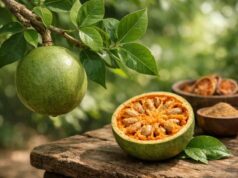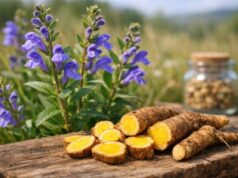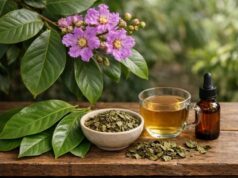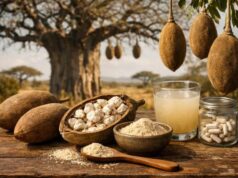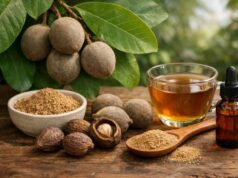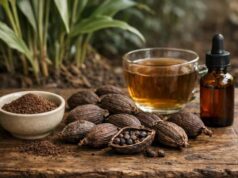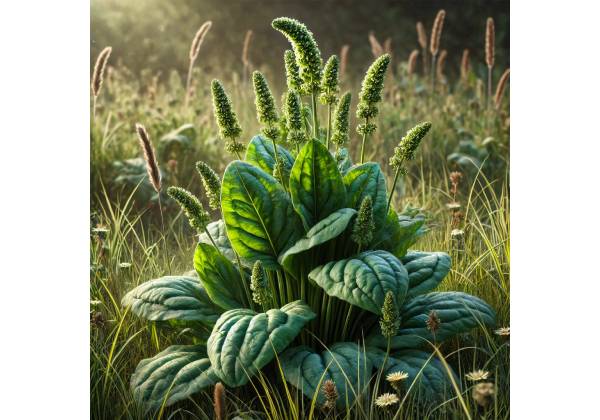
Broadleaf plantain (Plantago major) is one of the most familiar “accidental herbs” in the world—an unassuming lawn plant that has been used for centuries as a practical remedy for skin irritation, minor wounds, and respiratory and digestive discomfort. Herbalists often describe plantain as both soothing and gently “drawing,” which is why it shows up in first-aid traditions for bites, splinters, and hot, itchy patches of skin. Internally, the leaf’s mucilage can coat and calm irritated tissues, while its bitters and polyphenols add a mild astringent, toning quality that some people find helpful during scratchy throats or unsettled digestion.
What makes broadleaf plantain especially useful is its versatility: the same plant can be prepared as a fresh poultice, infused into a tea, made into a syrup, or used as a rinse for mouth and throat comfort. Still, “common” should not be confused with “careless.” Foraged plantain must be clean, correctly identified, and free of pesticide exposure, and supplement forms should be chosen with the same attention you would give any botanical product.
Essential Insights for Broadleaf Plantain
- May soothe irritated skin and support minor wound comfort when used topically.
- Mucilage-rich preparations can ease scratchy throat sensations and support gentle respiratory comfort.
- Common adult tea range is about 3–9 g dried leaf per day, divided into servings.
- Foraged leaves can carry contaminants; avoid roadside, sprayed, or pet-traffic areas.
- Avoid if you have a known Plantaginaceae allergy, or consult a clinician if pregnant, breastfeeding, or using prescription medications.
Table of Contents
- Broadleaf plantain basics
- Key compounds and actions
- Health benefits and best uses
- Broadleaf plantain for skin
- Broadleaf plantain for cough
- Broadleaf plantain for digestion
- Dosage, safety, and evidence
Broadleaf plantain basics
Broadleaf plantain (Plantago major) is a low-growing perennial with wide, oval leaves and strong parallel veins that run from the base to the tip. It thrives in compacted soil—yards, sidewalks, playground edges—which is part of why it is so widely known. The plant sends up slender stalks topped with dense seed heads, and those seeds are one reason plantain spreads so easily. In everyday language, “plantain” can cause confusion, so it helps to clarify what it is not: it is not the starchy banana-like fruit called plantain, and it is not psyllium husk (though psyllium comes from a related Plantago species).
Traditional herbal use focuses on the leaves. Fresh leaves are often used as a quick, on-the-spot poultice for bites and minor skin irritation. Dried leaves are used for teas, syrups, and rinses aimed at soothing the mouth, throat, and respiratory tract. In many traditions, plantain is considered a “tissue soother” with a practical, first-aid personality: it is not flashy, but it is often reliable when irritation and minor inflammation are the main issues.
Because plantain is commonly foraged, safety begins with location and cleanliness. Leaves gathered from roadsides, lawns treated with herbicides, or areas with heavy pet traffic can carry contaminants you do not want on broken skin or in a tea. If you forage, choose a clean area, rinse thoroughly, and avoid plants that look dusty, oily, or chemically stressed.
Identification also matters. Broadleaf plantain is often found alongside narrowleaf plantain (Plantago lanceolata), which has long, narrow leaves. Both are used in similar ways, and many people treat them as interchangeable for basic topical use. However, when you are purchasing supplements or making a consistent internal preparation, it is still wise to know which species you are using and to stick with one type during a trial so you can judge results fairly.
In short, broadleaf plantain is best approached as a flexible herb with strong first-aid roots: excellent for simple problems, supportive for mild internal irritation, and most useful when you match the form to the goal.
Key compounds and actions
Broadleaf plantain’s benefits are tied to a blend of soothing polysaccharides, bitter compounds, and protective polyphenols. Instead of acting like a single-ingredient drug, plantain works more like a “multi-tool” that can calm irritated tissue, support barrier repair, and gently tone inflamed surfaces.
Mucilage and calming “coating” action
One of plantain’s signature features is its mucilage—gel-like polysaccharides that swell in water. This matters because mucilage can:
- Soothe dryness and irritation in the mouth and throat
- Support a calmer feel in the upper digestive tract
- Provide a softening, protective layer that makes inflamed tissue feel less raw
This is why plantain is often grouped with other demulcent herbs. If you are building a soothing tea blend, pairing plantain with a classic demulcent such as marshmallow root soothing support is a traditional strategy for scratchy, irritated tissues.
Iridoids and phenylethanoids
Plantain contains iridoid glycosides (often discussed in connection with calming inflammatory signaling) and phenylethanoid glycosides such as plantamajoside (commonly studied for antioxidant and anti-inflammatory potential). These compounds are part of why plantain shows up in discussions of skin repair and irritated mucosa.
Tannins and gentle astringency
Broadleaf plantain also contains tannins, which contribute a mild astringent effect. In practical terms, mild astringency can:
- Help “tighten” and tone weepy, irritated skin
- Support minor bleeding control in superficial scrapes
- Reduce that overly slick, inflamed feeling that sometimes accompanies irritation
This astringent angle is one reason plantain is sometimes described as both soothing and “drawing.” It is not magic; it is a combination of tissue-toning and moisture-balancing effects that can be noticeable in small, everyday issues.
Allantoin, minerals, and supportive compounds
Plantain is often discussed as a source of allantoin-like skin-supportive activity (a compound associated with promoting smoother tissue repair). It also contains minerals and a range of flavonoids. These are not reasons to treat plantain as a nutritional powerhouse, but they help explain why the leaf can feel supportive in topical preparations.
The key takeaway is that plantain’s actions are format-dependent. Hot water infusions emphasize mucilage and water-soluble compounds, tinctures capture a different spectrum, and topical use lets the herb act directly where irritation is happening. When you choose the form intentionally, plantain tends to feel more consistent and easier to evaluate.
Health benefits and best uses
Broadleaf plantain is best known for “everyday medicine” benefits—supporting comfort in minor, common problems rather than treating severe disease. When used appropriately, its strengths show up in three main categories: skin and first aid, mouth and throat comfort, and gentle digestive support.
Where broadleaf plantain tends to shine
Plantain is often most satisfying when your goal is to calm irritation and support tissue comfort. Common uses include:
- Minor bites and stings that feel hot, itchy, or swollen
- Superficial scrapes and friction irritation
- Dry, scratchy throat sensations and post-nasal “tickle” discomfort
- Mouth irritation, especially when tissues feel tender (as a rinse)
- Occasional digestive irritation where a soothing, mucilage-rich tea is appealing
In these settings, the herb is often used as part of a practical routine: clean the area, apply the plantain preparation, and repeat consistently. People who expect a one-time “miracle” application are more likely to be disappointed than those who use it as supportive care for a few days.
Realistic outcomes and timelines
A helpful way to set expectations is to match the timeline to the tissue:
- Skin irritation and bites may feel better within minutes to hours, especially with a fresh poultice.
- Minor scrapes and rough patches usually need a few days of repeated topical use.
- Throat and cough comfort is often noticed during the same day, but the bigger outcome (less frequent coughing) may take several days.
- Digestive soothing is often subtle and may depend on how consistently you use the tea and whether triggers (very spicy foods, alcohol, stress) are still present.
What plantain is not best for
Plantain is not the right tool for everything. It is not a substitute for:
- Antibiotics when an infection requires treatment
- Proper wound care for deep cuts, punctures, or burns
- Medical evaluation for persistent cough, shortness of breath, or chest pain
- Management of chronic inflammatory disease without clinician oversight
If you use plantain as a supportive layer—not the whole strategy—you can get clearer, more reliable results. For example, a small scrape needs cleaning and protection first; plantain is the “comfort and healing support” layer after the basics are covered.
A useful rule is this: plantain is most effective when the problem is primarily irritation and mild inflammation, and when you can apply it directly to the tissue (topically or as a rinse) or use it consistently in a soothing internal preparation.
Broadleaf plantain for skin
Broadleaf plantain’s reputation as a “first-aid weed” comes from how reliably it can soothe irritated skin when used correctly. The leaf is especially valued for bites, minor rashes, friction irritation, and small scrapes—situations where the skin barrier is stressed and you want relief without harsh ingredients.
Common topical uses
Plantain is often used for:
- Mosquito bites and mild stings
- Itchy, irritated patches after outdoor exposure
- Superficial scrapes and abrasions
- Splinter support when the skin feels inflamed around the entry point
- Razor burn or friction irritation (when skin is not broken or is only mildly abraded)
Because the leaf contains mucilage and astringent compounds, it can both soothe and reduce that “puffy, angry” feeling that often comes with bites and minor irritation.
How to make a simple fresh poultice
A fresh poultice is one of the most effective ways to use plantain quickly:
- Rinse the leaf thoroughly.
- Crush, roll, or chew briefly to release juices (spit poultice traditions exist, but hygienic crushing is often a better choice).
- Apply the softened leaf directly to the irritated area.
- Hold in place for 10–20 minutes, then repeat as needed.
For convenience, many people prefer infused oils or salves for repeated use. Plantain-infused oil can be made by drying leaves fully (to reduce moisture), then infusing in a stable carrier oil before straining. Salves add beeswax for a more protective layer, which can be helpful for friction irritation and rough patches.
Pairing strategies for better results
Plantain can be used alone, but it also layers well with other gentle skin botanicals. For example, calendula skin soothing and repair is often used for similar “minor irritation” patterns. A simple approach is to use plantain for the “cooling, drawing” feel and calendula for comfort and barrier support, while still keeping the routine minimal enough to identify what is helping.
When not to self-treat
Skip home treatment and seek medical care if you have:
- Signs of infection (spreading redness, warmth, pus, fever, red streaking)
- Deep puncture wounds, animal bites, or embedded foreign bodies
- Significant burns or blistering over large areas
- Rapidly worsening swelling after a sting, or any breathing difficulty
Used appropriately, broadleaf plantain can be a practical, soothing companion for minor skin troubles—especially when hygiene, clean sourcing, and repeated application are part of the plan.
Broadleaf plantain for cough
Broadleaf plantain is often used for cough and throat irritation because it can soothe the tissues that trigger the urge to cough. Many coughs persist not because something is “stuck,” but because the throat and upper airway are irritated—dry air, post-nasal drip, or inflammation after a viral illness can keep that reflex active. Plantain’s mucilage can coat and calm, while its polyphenols may support a more balanced inflammatory response in irritated mucosa.
Best-fit cough patterns
Plantain tends to be most useful when cough is accompanied by:
- A scratchy, dry, tickly throat sensation
- Frequent throat clearing
- Irritation that feels worse at night or in dry environments
- Post-illness sensitivity where the infection has improved but the cough lingers
It is usually less helpful as a stand-alone strategy for severe, productive cough with chest tightness, wheezing, or shortness of breath. Those patterns deserve medical evaluation rather than relying on herbs alone.
Practical ways to use it
Common preparations include:
- Tea: A warm infusion can provide immediate soothing for scratchy throat sensations.
- Syrup: Plantain syrup is often used when you want longer-lasting coating and easier dosing.
- Gargle or rinse: A cooled tea can be used as a mouth and throat rinse when irritation is high.
A simple tea approach is to steep dried leaf in hot water for 10–15 minutes, strain, and sip slowly. For cough comfort, the goal is not to gulp a large volume quickly; it is to let the tea contact the throat.
If you want a stronger “coating” effect, combining plantain with another demulcent can be useful. For instance, slippery elm for throat soothing is often used for the same kind of scratchy, irritated feel and may pair well in a conservative blend.
How to judge whether it is working
Plantain’s success is often measured by comfort metrics rather than “cure” metrics:
- Does your throat feel less raw within an hour of use?
- Are coughing fits shorter or less frequent over 2–4 days?
- Do you sleep more easily because the tickle is reduced?
If the cough is persistent (more than 3 weeks), accompanied by fever, chest pain, blood, weight loss, or shortness of breath, treat that as a red flag. Plantain can be supportive, but it should not delay evaluation when symptoms suggest something beyond routine irritation.
Used thoughtfully, broadleaf plantain can be a gentle, tissue-supportive option for coughs driven by irritation—especially when hydration, humidification, and rest are also part of your approach.
Broadleaf plantain for digestion
Broadleaf plantain is sometimes used for digestive comfort because its mucilage can soothe irritated tissues and its mild astringency can help “tone” overly reactive digestion. This is not the same as a laxative or a strong anti-spasm herb. Instead, plantain is often chosen when the digestive tract feels sensitive—when you want calm, not stimulation.
Digestive situations where plantain may help
Plantain tea is most commonly used for:
- Occasional stomach “rawness” linked to irritation
- Mild, stress-sensitive digestion where the gut feels reactive
- Throat-to-stomach comfort when reflux or post-nasal drip creates a scratchy, unsettled feeling
- Loose stool episodes where you want gentle astringency and soothing support (not a harsh stop-everything approach)
Because mucilage works by coating, it can sometimes feel helpful during periods when spicy foods, alcohol, or heavy meals make digestion feel inflamed. However, it is not a replacement for medical care if symptoms are persistent, severe, or associated with bleeding, weight loss, or ongoing vomiting.
Plantain vs psyllium
People often confuse broadleaf plantain (Plantago major) with psyllium husk, which comes from a different Plantago species and is primarily used as a fiber supplement. Psyllium is more predictable for bowel regularity because it is standardized as a bulk-forming fiber. If your goal is stool regulation rather than mucosal soothing, psyllium for digestive regularity is usually the more direct choice.
Broadleaf plantain, by contrast, is typically used for comfort and irritation patterns, not for structured fiber dosing. Some people do notice that plantain tea feels gently supportive when digestion is touchy, but it is not usually strong enough to correct chronic constipation or diarrhea on its own.
How to use it without making things worse
A practical approach for digestive comfort is to keep the tea mild and consistent:
- Use a moderate strength infusion and drink it warm.
- Take it between meals or after meals depending on what feels best for you.
- Avoid stacking many new herbs at once; keep the trial clean.
If you are prone to bloating, start with smaller servings. Mucilage-rich teas can sometimes feel “heavy” for sensitive stomachs, especially if taken very concentrated.
When to stop and reassess
Stop plantain and reassess if you notice worsening nausea, abdominal pain, or new digestive symptoms that persist. Also, if you use medications that must be absorbed reliably, remember that mucilage and fiber can interfere with absorption when taken at the same time. Separating plantain tea from medications by a couple of hours is a sensible precaution.
Broadleaf plantain can be a gentle ally for digestive irritation, but it works best as supportive care alongside hydration, trigger reduction, and appropriate medical evaluation when symptoms are more than occasional.
Dosage, safety, and evidence
Broadleaf plantain is generally considered a low-risk herb when used appropriately, but “low-risk” still depends on product quality, clean sourcing, and sensible dosing. It also depends on using the herb for problems it realistically matches: irritation, mild inflammation, and tissue comfort—not severe disease.
Common adult dosage ranges
Dosing varies by form and strength, but typical adult ranges used in herbal practice include:
- Tea (infusion): about 3–9 g dried leaf per day, divided into 2–3 servings (for example, 1–3 g per cup, two to three times daily)
- Tincture (typical liquid extract): about 2–4 mL up to three times daily, depending on concentration and label directions
- Syrup: often 5–10 mL up to three times daily for short-term cough comfort, following product instructions
- Capsules/powder: commonly 500–1,500 mg per day, split, but labels vary widely
- Topical: poultice, compress, or salve 2–4 times daily as needed
For short-term issues (bites, scratchy throat, post-illness irritation), many people use plantain for several days to two weeks, then stop once comfort is restored. For longer patterns, reassess every few weeks to confirm it is still helping.
Safety and who should avoid it
Avoid plantain or use only with professional guidance if:
- You have a known allergy to Plantaginaceae plants
- You are pregnant or breastfeeding and considering high-dose or long-term use
- You have chronic conditions that require tightly controlled medication absorption
The most common side effects are mild: occasional digestive upset, loose stool with strong preparations, or rare skin sensitivity. Topically, any plant can cause contact irritation in sensitive individuals, so testing a small area first is wise.
Interactions and practical precautions
Because plantain is mucilage-rich, it may reduce absorption of some oral medications if taken at the same time. A practical safety habit is to separate plantain tea or fiber-like preparations from medications by at least 2 hours. If you use anticoagulants, immunosuppressants, or other high-stakes medications, ask a clinician before adding frequent herbal preparations.
For foraged plantain, contamination is the bigger safety issue than the herb itself. Avoid leaves from sprayed lawns, roadsides, or polluted soil. Wash thoroughly, and do not apply foraged leaves to deep or heavily contaminated wounds.
What the evidence actually supports
Modern research includes clinical studies on topical plantain preparations for wound contexts and syrup-style preparations for cough comfort, alongside a larger body of laboratory work on anti-inflammatory, antioxidant, and antimicrobial activity. The strongest, most practical takeaway is modest: plantain appears plausible and sometimes clinically supportive for tissue irritation and wound-related comfort, but results vary by preparation, dose, and condition. For many uses, traditional practice still leads the evidence, and it is best to keep claims realistic and use the herb as supportive care rather than primary treatment.
References
- The therapeutic effects of Plantago major and its main constituents on respiratory diseases: a narrative review – PubMed 2025 (Review)
- Effect of Plantago major on cough severity in acute bronchitis: A double-blind randomized clinical trial – PMC 2024 (RCT)
- The Effect of Plantago major Hydroalcoholic Extract on the Healing of Diabetic Foot and Pressure Ulcers: A Randomized Open-Label Controlled Clinical Trial – PMC 2022 (RCT)
- Phytochemical evaluation and exploration of some biological activities of aqueous and ethanolic extracts of two species of the genus Plantago L – PMC 2024 (Phytochemistry Study)
Disclaimer
This article is for educational purposes only and does not provide medical advice, diagnosis, or treatment. Herbs and herbal products can vary in identity, purity, and strength, and individual responses differ. Foraged plants may carry contaminants such as pesticides, heavy metals, or microbes depending on where they grow. If you are pregnant or breastfeeding, have a chronic medical condition, or take prescription medications—especially those requiring consistent absorption—consult a licensed clinician before using broadleaf plantain regularly. Seek medical care for deep wounds, signs of infection, severe allergic reactions, persistent cough, shortness of breath, chest pain, or digestive symptoms that are severe or do not improve.
If this guide was helpful, consider sharing it on Facebook, X (formerly Twitter), or your preferred platform so others can make safer, more informed choices.

